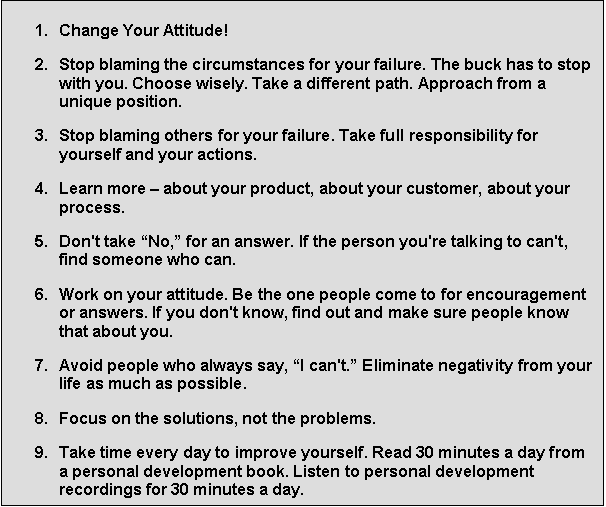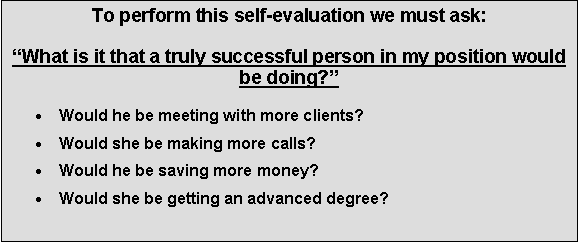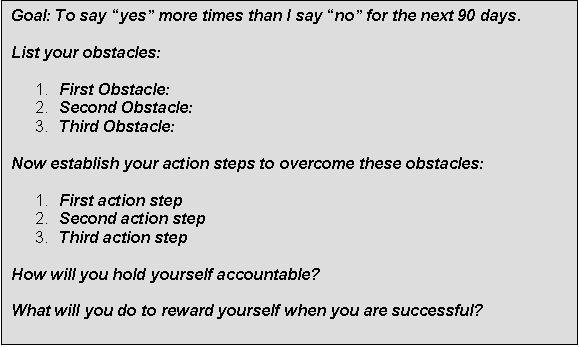The only way humans can change is if they choose to change. We all want good results from the effort that we put forth.
For the most part, we are willing to put in the necessary hard work, and most of us know we have to pay the price to achieve success and happiness. What a lot of us do not know is that we have it in us to put our human potential into action and reach the result we desire.
However, there is a little secret.
There is a single attribute that will determine the level of our potential. It will determine the intensity of our activity. It will predict the outcome of our effort: It is attitude.
Positive Attitude vs. Negative Attitude
Have you heard people say, "You must have gotten up on the wrong side of the bed"? I thought, for years, that I would have to figure out which side of the bed that was because I certainly had my fair share of bad days.
Most everyone does!
Does that mean that there is actually a wrong side of the bed? We know the answer to that question is no. Whether you have a good day or a bad day is entirely up to you.
By choosing to have a positive attitude rather than a negative attitude, you can change your life.
o Attitude will determine just how much of our own future we are going to see.
o Our dreams will be sized by our attitude.
o Attitude alone determines how much determination we will have when faced with new challenges.
Anger belongs to us alone.
No one can make us angry. In fact, we can become angry only when we allow someone else power over our own attitude. The actions of another person belong to that person. We alone choose how to respond to their actions. We may not be able to control a situation, but we do control how we respond to the situation.
Attitude is an asset. A treasure. We must guard it carefully and never surrender it. Having the right attitude will allow us to achieve success.
Empathy is critical here. One of the greatest gifts you can give your client is to be as present and as empowering for them as someone has been for you. Your clients need you to understand why making change in their lives is difficult and that you fully support them at this critical phase of their development.

Without sounding judgmental, a critical responsibility of a coach is to help the client identify and evaluate his or her attitude. The person's attitude toward himself or herself, toward others, and toward life needs to be evaluated.
Much of what holds us back is the idea that we somehow made a mistake. When we make a mistake, we have to deal with all the subsequent repercussions and consequences. Fearing a negative outcome and the resulting criticism, many of us develop a very negative view of the world in general and of ourselves specifically.
This often leads to fear, which is completely debilitating. Fear plays a huge role in our behavior. Fear can be paralyzing. It makes people afraid to act because of their fear of making a mistake or looking foolish. We fear negative reactions. We fear bad outcomes. We fear losing face.
Fear keeps us stuck and can result in a negative attitude toward important things in our lives. Our attitude is an outward expression of the feelings we hold inside.
As we already have discussed, attitude determines how we ultimately approach life and the people who populate it. As a result, our attitude is the one defining part of us that will determine our success or failure.
When we face a difficult task, it is our attitude more than our approach that will predict how successful we are in the end. Because of this, the result of most projects or goals is determined at the outset. If you are determined to fail, you likely will fail. If you are determined to win, you likely will win. We can choose to look at a situation either positively or negatively.
Are you a generally optimistic person? Do you feel that you are capable of accomplishing the most difficult of tasks? This portends well for your future.
With this kind of attitude, you now are in a position of greater control. By changing your response to a situation, you now have an unlimited number of action steps you can take. Before, you were limited. Now, you are limitless!
What is attitude? It is the way you apply yourself to your thoughts about a given situation. It is how you choose to view a situation. You either can choose to apply your thoughts and yourself to a situation positively or negatively. Having a positive or negative attitude is a choice.
Challenges to your attitude are all around you. They come from your own thoughts and from the expressed opinions of your co-workers, friends, and family. Do you allow the problems of others to become your own? If someone is having a bad day, do you feel compelled to join them in feeling down? Just because those around you are feeling that things are going badly for them, you do not have to join them.
It is a choice.
Those around you have a choice in how to respond just as much as you do. In fact, if you learn nothing else from this life coaching class, you will have a tool that is capable of changing the rest of your life.
Self-defeating Behavior
So what do you do when everyone around you is falling into the negative "woe is me" trap? You have a choice. You can join them or you can walk away. If you walk away, you run the risk of alienating them. We will talk more about that later. If you decide to join them, read on.
You are thinking about throwing your support in with those who are expressing a highly negative attitude. OK. That is a choice. I will not say it is good or bad. Let us evaluate it.
In part, you feel sorry for people who are having problems. You have empathy for them and their situation. There is a saying, "Misery loves company." When you are miserable, it really is nice to have people around you who are understanding and sympathetic. After a while, however, you start to get tired of the pity party. For you, the time has come to move on. What do you do? Your friend, sister, or business partner is still fully wrapped in a cocoon of misery.
o Do you stay in it with the person?
o Is that person's timetable yours?
o Can you help the person more by continuing to have a negative attitude about the situation?
o Do you have responsibilities and goals yourself that you are neglecting?
o Are you getting tired of hearing about the same problem rehashed over and over without any progress toward a solution?
Did you know that it takes more energy to be negative than it does to be positive? Is that perhaps the reason why you are exhausted when you spend a lot of time around negative people? Having a negative attitude is entirely up to you; it is a choice, nothing more, nothing less.
How to Improve
The first thing to do is to observe those around you. The fact is, more people believe in failure than in success. Does this ring true for you? Think about it. When faced with a problem, do people bring up more solutions or more reasons why something cannot be done? This happens all the time in the workplace.
People handicap themselves with negative statements, a litany of "I can't" statements.
o "I can't get anyone to return my calls."
o "I can't make this program work."
o "I can't find it."
o "I can't get hired."
o "I can't get anyone to do anything."
When you are around an "I can't" person, it is true.
Nothing gets done. They have made the determination that they cannot be successful. If you do not want to fail, you need to either get away from such people, or you need to change your attitude.
When you are around an "I can" person, hold onto your hat because you are going places!
How do you fix it?
 Read:
Read:
o How To Win Friends and Influence People - Dale Carnegie
o Think and Grow Rich - Napoleon Hill
o How to Stop Worrying and Start Living - Dale Carnegie
o The Power of Positive Thinking - Norman Vincent Peale
o What Do You Say When You Talk to Yourself - Shad Helmstetter
Listen to people like Michael Clouse, Tony Robbins, Jim Rohn, Zig Ziglar, and Dennis Waitley
Changing the information and input into your brain will change your life. When you listen to negative things, including the news, you falter. When you listen to motivational recordings, you really become motivated. From there, you can change the world.
Looking Inside
Understand the following:
o Most people already know the answers to their personal challenges.
o They have the intrinsic power to change.
o They are capable of achieving their goals and dreams.
When you understand this, you will have discovered one of the most powerful tools you ever will develop as a life coach.
As their coach, you believe in your clients. You may be the very first person who truly believes in them. This means that your job is to function as a bridge or a road from here to there. By having your client look deep inside, you can help him or her to change the "I can't" statements to "I can!" You work with the the client to remove negativity, doubt, and self-criticism.
You teach clients to deal with uncertainty and fear that will sabotage them. Much of the time, you will be the only person who believes in your clients. You must believe in them even when they doubt themselves. With that kind of encouragement, they finally will believe they can be successful.
We must face the honest truth about where we are in life. Without this type of self-analysis, we will not be able to make any progress.
You will find your client reluctant to do this. Be understanding. If you have done it with yourself, you will have developed the necessary empathy to help your client with this stage. Let them know that you understand they are afraid of what they will discover.
Remind them that they already know it is there, but they are trying to hide it, from the world and from themselves.
Most of us live with our heads buried in the sand, refusing to acknowledge what we are avoiding. We do this because there is pain involved in self-discovery. We do not want to admit the cost of that behavior because that brings even more pain. We even have convinced ourselves that by ignoring it we can somehow make it better.
We know this is not true, don't we? To make any kind of change, we have to make an honest assessment of where we are. Only then can we move on.

Now, for each item on that list, ask your client to write down the cost to him or her for not doing those things.
o What is the cost of meeting with only two clients versus the 20 clients a successful person would meet with in a week? Let us say you make $100 per client. You would therefore make $200 a week, and the successful person would make $2,000 a week. The cost to you is $1,800 a week.
o What is the cost of making five calls a week at $25 per call when the successful person makes 50 calls a week at that price? The cost to you is $1,125 a week.
o What is the cost to you for not saving $25,000 a year? After one year? After 10 years, the cost to you is $250,000, plus all the lost interest.
o What is the cost to you for not getting your master's in business administration (MBA) degree? In salary? In promotion opportunities?
Once you have identified the cost for your lack of action, it is time to evaluate how you talk to yourself. When we say negative things to ourselves, we are mistaken in thinking that it is motivational. We learn self-talk as children. We learn it from our parents, friends, relatives, and teachers. When we are so young, we have no way to evaluate the truthfulness of a statement.
If we are told, "You're an idiot," about 100,000 times, don't you think you will start believing you are an idiot? Sadly, most people who try to motivate others use language that is negative and detrimental. Think about how the neural pathways in your brain develop.
The more times they are exposed to some statement, the stronger that pathway becomes and the more likely you are to believe it.
If you are told "You're beautiful," 100,000 times, and you are told "You're ugly," about 50 times, which one would you believe?
Naturally, you will believe the one you have been told most often.
Sadly, in our society we typically speak out only about another person's behavior or abilities when that person is doing something wrong. Think about it: If your child is sitting quietly and coloring, you are so happy to have some peace and quiet that you hold your tongue because you do not want to ruin it. However, if your child chooses to color on the walls or would rather play a rambunctious game of tag while you are trying to read or watch a program on television, you probably will yell at them to pipe down.
Which message do you want your kids to hear, the silent one in which you were enjoying the peace and quiet of their good behavior or the one in which you yelled at them to be quiet?
The truth is that we get negative to positive feedback in a ratio of about 90:1. In other words, we are told 90 times when we have done something wrong for every one time we receive positive reinforcement.
Small wonder that the majority of what we say to ourselves is negative.
What This Does to Us
It is time to change this behavior. The first step is to be aware of it. Understanding why we are so hard on ourselves helps us take steps toward change. It should be evident why it is necessary, but this must be crystal clear to everyone: Your attitude is a direct result of what you believe about yourself.
Answer the following questions by placing a checkmark next to the word in each pair that best describes you right now:
I _____ anticipate _____ am nervous.
I feel _____ appreciated _____ rejected.
I feel _____ determined _____ reluctant.
I have a sense of _____ achievement _____ justification.
I am _____ certain _____ uncertain.
I am _____ lucky _____ unlucky.
I am _____ optimistic _____ pessimistic.
This test might seem to be pretty obvious at first glance and, because you know what we are looking for, you probably had most of your checkmarks on the left side rather than on the right side.
However, the more you look inside yourself, the more honest you are, the more times you take this assessment when things are not going as well as you would like, you will begin to see your patterns. You will discover how you react immediately to a difficult situation or to bad news.
Use this table to help your clients identify the way they automatically respond to a situation, not the way they think they respond.
The key to change is talking yourself into feeling the emotions on the left side when you face a difficult time. That will take work.
By having a negative image of yourself, you set yourself up for failure. Your self-talk will predict your performance.
You can watch a football game and almost predict when a team has lost the game. You can see it in their faces, their behavior, and their body language. They project defeat long before they ever admit it.
When you believe yourself to be defeated, you have lost the game.
Did you know that you will hear the word "no" more than 100,000 times in your lifetime?
Most of us will hear it even more than that. Just to hear that word that many times means that we hear it at least four times a day for 70 years.
How many times do you hear the word "yes"?
Try this for a day. Keep track of the number of times you say "yes" to people and the number of times you say "no." Do this for people who talk to you. How many times a day do you hear the word "yes" and how many times do you hear the word "no"?
Your next step is to change that ratio.
How to Change
The first step on the road to change is to face yourself. If you find that you naturally are negative, stop for a moment and ask yourself if you are responding out of habit or out of knowledge. If your reaction was out of habit, then make it a point to gather more information and consciously say to yourself, "I don't have all the information yet to make a determination."
Use phrases such as the following:
o "Let's see."
o "What else can I do?"
o "Is there another alternative?"
o " How can I do that?"
In order to change a habit, you need to practice the new behavior for 90 days.
Yes, it takes that long to change an old behavior and create a new habit.

One other way to change your self-talk is to accept criticism with gratitude. Rather than apologizing for something and immediately putting yourself in the wrong, say, "Thank you."
Why?
When someone points out a problem, they have identified an obstacle to a goal you may not have recognized for yourself yet. One coach used that response every time someone raised an objection. Rather than saying, "I'm sorry," she said, "Thank you for that. I can see that I didn't make that clear for you. How about if we look at it like this."
Not only do her words acknowledge her responsibility, they also indicate that she is willing to do something to correct it. Saying, "I'm sorry," is good manners, but it implies that you are bent over waiting to be punished for a wrongdoing. Saying, "Thank you for pointing that out," indicates that you accept responsibility and are strong enough and have the confidence to put it right.
Keep in mind that this does not work if you have truly wronged someone. In that case, a sincere "I'm sorry" works best.
The next time someone presents a problem to you, use one of the following phrases:
o No problem.
o My pleasure.
o We can solve it this way _____.
o Thank you!
o I can help!
o Yes. I see what you mean.
o Consider it done!

































